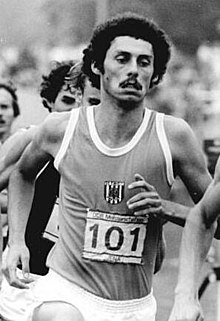
Andreas Busse (born 6 May 1959 in Dresden) is a German former middle distance runner who represented East Germany during his career. He was a member of the Sportclub Einheit Dresden.

Andreas Busse (born 6 May 1959 in Dresden) is a German former middle distance runner who represented East Germany during his career. He was a member of the Sportclub Einheit Dresden.
| Year | Competition | Venue | Position | Event | Notes |
|---|---|---|---|---|---|
| Representing | |||||
| 1980 | Olympic Games | Moscow, Soviet Union | 5th | 800 m | |
| 4th | 1500 m | ||||
| 1983 | World Championships | Helsinki, Finland | 7th | 1500 m | |
| 1984 | Friendship Games | Moscow, Soviet Union | 1st | 1500 m | 3:36.65 |
| 1986 | European Championships | Stuttgart, West Germany | 18th | 1500 m | |